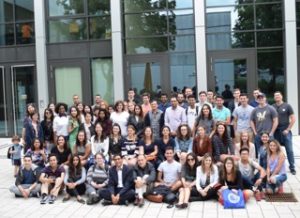Things Are Heating Up in Germany
 The 2017 Summer Session in International and Comparative Law is off to a hot start, matching the temperature in Giessen, Germany. In this photo, you see a mix of jet-lagged law students from all over the world posing outside of the law school at Justus Liebig University (you can also see me and Professor Anuj Desai from the University of Wisconsin). The students attended orientation this past Sunday, and then set off on a “city rally” in which small teams of students competed to locate different check-in points located throughout the city of Giessen. It was a fun way to get introduced to their new surroundings. Then it was back to the law school for the group photo and a Welcome Dinner.
The 2017 Summer Session in International and Comparative Law is off to a hot start, matching the temperature in Giessen, Germany. In this photo, you see a mix of jet-lagged law students from all over the world posing outside of the law school at Justus Liebig University (you can also see me and Professor Anuj Desai from the University of Wisconsin). The students attended orientation this past Sunday, and then set off on a “city rally” in which small teams of students competed to locate different check-in points located throughout the city of Giessen. It was a fun way to get introduced to their new surroundings. Then it was back to the law school for the group photo and a Welcome Dinner.
Our 10 Marquette Law School participants have now joined their classmates (and new friends) from countries that include Brazil, Colombia, Poland, Vietnam, Egypt, and Portugal, and have completed three days of classes. Interest and enrollment appears equally divided among our four course offerings: 1) International Economic Law and Business Transactions, 2) Comparative Constitutional Law, 3) Business Ethics and Human Rights, and 4) CyberLaw.
Following the last class on Thursday, the students will board buses for a 3 day field trip to Berlin and surrounding sights. At this pace, the four weeks of the program will fly by. However, I happen to know that some of the U.S. students have still found time during this first week to visit a local beer garden and participate in a karaoke night.
Our program is open to any law student in the United States attending an accredited law school. Details on the 10th annual Summer Session, scheduled to begin July 14, 2018, will be available this fall. Watch this space for course, faculty and tuition information.

